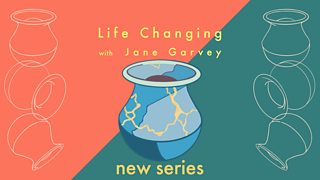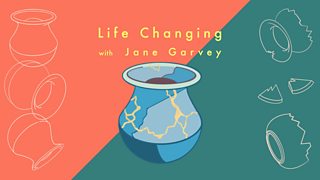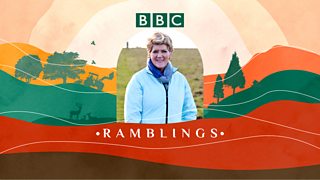A country walk that nearly killed me
One autumn day in 2019, retired teacher Pip Peacock was out walking in the Peak District with her beloved dog, Buster. They took a short cut across a field where some cows were grazing. Moments afterwards, what was a perfectly pleasant afternoon turned into chaos.
In Life Changing, Jane Garvey discovers what happened and the legacy it left.
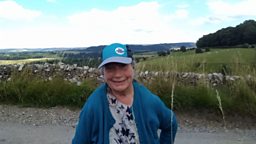
Pip and Buster
In 2018, Pip Peacock, a maths teacher for over 40 years, her husband Philip, and the family dog, Buster, moved from Newbury to Bakewell in Derbyshire. Buster was a cherished family member. Rescued by Pip and her husband aged just 18 months, he lived with the family for 11-and-a-half years. “He was just a very gentle, loving dog,” says Pip. The Peak District was perfect for Buster, with so many great walks to go on.
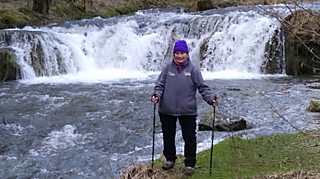
The fateful afternoon
One afternoon in September 2019, Pip was driving through Bakewell on a recce to locate a garage where her car was due to have its MOT few days later. “It was most unusual for me to be anywhere near this organised,” she recalls. Overshooting the garage, Pip decided to park up and walk back into the village through the fields. “We started walking and I suddenly remembered there was a very difficult stile that Buster [aged 13 by this time] wouldn’t get over.” Unable to lift him over, Pip took Buster across a nearby field with a gate visible on the other side. “I don’t think it was a particularly big field and there were cows there [nearly 60 of them it later turned out], but I didn’t think anything of it as Buster was quite used to walking through cows where we lived in Newbury.”
However, Pip recalls that she started to have a feeling that “something was up”. Although the official advice for walking through a field of cows with your dog is to let go of your dog’s lead (the theory being that the dog will run off and the cows will follow the dog), Pip could see the gate on the other side, “so I kept Buster on a really short lead, and we just stayed quiet as we walked across the field.”
The attack
“I don't actually remember the beginning of the attack,” recalls Pip, “but, when I came to, I was lying on the ground. I think this cow kicked me, and I rolled over and put my head in my hands and said Psalm 23, ‘The lord is my shepherd. I shall not want. He makes me lie down in green pastures.’”
“I've been a Christian a long, long time, and my faith is incredibly important to me. At the time when I really needed it, I was aware of God's presence with me and I wasn't afraid to go into what I believe will be a better life with no pain and no suffering. I was very peaceful. I really, really thought I was going to die.”
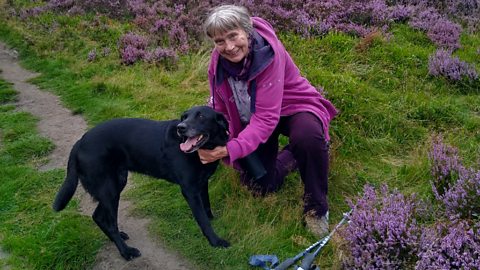
"I really thought I was going to die"
Pip describes the moment in which her pleasant country walk changed dramatically
The rescue
A group of people who had been out taking photographs of the countryside shouted at the cows and chased them away. One of them put something over Pip to keep her warm. “I now know I was in the field for probably an hour,” Pip says, “and they could see me slipping away. They definitely thought I was going to die.”
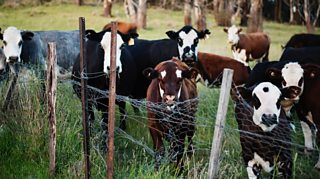
“He died protecting me, which is what he would have wanted to do if I could have asked him, because that's the sort of dog he was.”
A doctor arrived and intubated Pip on site so that she could breathe. Pip can’t recall this but says: “I think it was very traumatic for these three people, but they were completely calm and reassuring, and they didn't ever give me the impression that there was no point them helping me.”
An air ambulance took Pip to hospital. Although not aware of her serious injuries at the time, Pip now knows that she wouldn't have survived without it, “I'm 100 percent sure of that.”
Counting the cost
Among Pip’s injuries were 34 breaks to the ribs, a punctured lung, a broken collarbone, a broken finger, a serious leg wound and damaged shoulder ligaments. She needed 17 titanium plates fitted inside her. The operation to do this would be the second trauma to her body in two days, and doctors warned her husband and three sons that Pip might not survive the operation.
Pip did have some luck, however. “The chap who operated on me had worked with people who do the bull run in Pamplona, Spain, and so he was used to dealing with people with injuries from cows.”
With expert care, Pip managed to get out of the hospital in two weeks, including eight days in intensive care. It was not a comfortable experience. “When the nurses came in to turn me over in her bed, which they did twice a day, I wanted to scream ‘please don’t, it hurts so much’ but I couldn’t because I was on a ventilator.”
A faithful friend
Very sadly, Buster did not survive the attack. Pip is philosophical about this because he was old, and a dog in decline is “not a nice thing to watch”, but also because “he died protecting me, which is what he would have wanted to do if I could have asked him, because that's the sort of dog he was.”
Convalescence
Because her house has shallow “old lady stairs”, Pip thought she would manage quite well at home, but admits that “you don't realise how protected you are in hospital.”
Pip’s spirits were generally good, but she needed a lot of help to do basic things. She received a lot of help from family, friends and her church, who provided her with meals for a while.
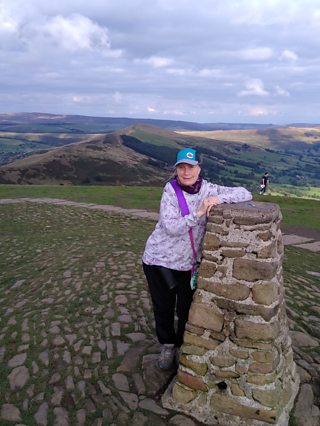
Small gestures from others really mattered during this time. “One of my neighbours, who I didn't know terribly well, came in and brushed my hair and just chatted for a while. It was a huge thing to me,” says Pip.
“I was coming out of my own personal lockdown,” is how Pip describes her recovery. She did so just as the national lockdown came in. With walking one of the few things people could do at the time, it was a great opportunity for Pip to regain her mobility. “It wasn't too long before I could do a circuit and build up my distances,” she says.
By the time of the third lockdown, going into 2021, Pip was restless. “I said to Philip, ‘I need something to focus on.’ So, I decided to take on the challenge of walking a thousand miles in the year and thought, ‘Oh, I could probably do this sponsored.’” Pip got in touch with the Air Ambulance Service to raise money for them. She has recently reached her 1000-mile target.
A lasting effect
Pip still experiences pain every day but distracts herself by walking. “Just the repetition of putting one foot in front of the other helps,” she says. Likewise, when Pip is sitting down, she finds the repetitive action of knitting to be a release.
Though she now feels she can “rise above it”, Pip remembers a particularly low point when she said to her husband, who was still working full-time while helping his wife’s recovery, “’I think it would have been better if I'd died.’ He was absolutely distraught and just showed me how much he loves me. I've never thought that since.”
Pip’s worldview has inevitably shifted slightly since her traumatic experience in 2019. “I would say I'm better at stopping and really listening to people,” she says, adding: “I try to concentrate on what I can do, not what I can't, and I think that's quite a good attitude to have to life.”
“I can honestly say that, as a result of this accident, good things have happened to me that probably wouldn't have happened without it. I don't understand why it happened, but I don't question it too much. I just try and get on with everyday life.”
-
![]()
Life Changing with Jane Garvey
Listen to Pip as she tells Jane about the country walk that nearly killed her.

More to discover on Radio 4
-
![]()
Life Changing with Jane Garvey
Jane Garvey talks to ordinary people about an extraordinary turning point in their life.
-
![]()
Fortunately... with Fi and Jane
Fi Glover and Jane Garvey have a chat with comedian Bridget Christie.
-
![]()
The Flipside with Paris Lees: Layers of Language
Can speaking in another language change who we are?
-
![]()
Ramblings
Clare Balding joins notable and interesting people for a walk through the countryside
